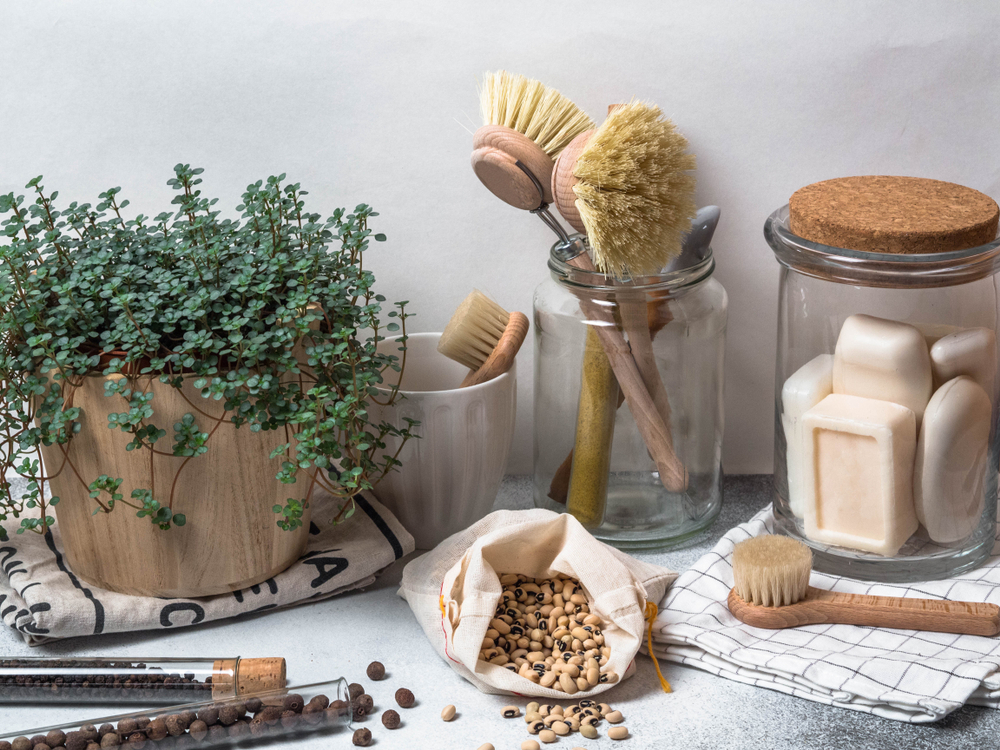
Image Source: Shutterstock — Originally Posted by Sandy Dodge
Waste-reducing principles
Instilling some basic principles of waste reduction into your household will create a solid foundation to build upon.
- Only buy what you will eat. Food waste is a common problem in households everywhere, and the best remedy is to plan ahead before you take your next trip to the grocery store. This method of planning meals will reduce the chances of throwing away unused food items and minimize your food waste overall.
- Keep your recycling clean. It doesn’t take much time to give your recyclables a quick rinse, but it makes a big difference at the recycling center. Avoid recycling items like plastic bags, greasy take-out food containers, and batteries, which contaminate the rest of your recycling.
- Use containers for drinks. Bottled water and paper coffee cups are wasteful and, unfortunately, ubiquitous. By purchasing a durable metal or glass water bottle and a thermos for coffee, you will greatly reduce the waste that comes as a byproduct of daily beverages.
In-home waste reduction
Reducing waste in the kitchen, bathroom, and yard will make a significant difference in the amount of overall waste generated at home.
Kitchen
- Reusable containers: Adding plastic and glass containers to your kitchen repertoire will not only help to reduce food waste, but they will decrease your use of plastic. Mason jars are useful for storing bulk items such as rice, beans, and oatmeal.
- Single-use alternatives: Single-use items like paper towels, paper plates, and plastic cups can be replaced by reusable alternatives. Use kitchen rags to clean up instead of paper towels and hand wash all plates and cups when possible.
- Countertop compost: Set up a small compost bin on your countertop to ensure all compost is accounted for during food prep. When the container is full, take it outside to a larger outdoor compost pile or container.
Bathroom
- Cut down on plastic: For common bathroom items like shampoo, conditioner, and body wash, consider buying in bulk and using a personal container for each. This saves money and reduces the amount of plastic on your bathroom shelves. You can also look for similar products in bar form.
- Continue to recycle: Your home’s recycling practices should go beyond the kitchen. Place a recycling container next to all bathroom garbage bins throughout the house to ensure you dispose of recyclable products properly.
- Reusable razors: Plastic razors have a short shelf life and pose serious recycling problems. Explore more eco-friendly shaving products next time you buy. Look for companies with razors that last and offer subscriptions for replacing blades.
Yard
- Compost: Composting is one of the best things you can do to help reduce waste. Fruits and vegetables, eggshells, coffee grounds, as well as things like yard trimmings, houseplants, and fireplace ashes are all compostable. If you don’t have the space for an outdoor compost, see what community composting options are available near you.
- Other: If you live in a rainy climate, explore installing rainwater catchments in your home. Check for local regulations and tips on preventing pollution before proceeding with any rainwater harvesting.
For additional tips on how to reduce waste at work, at home, and in your community, visit the Environmental Protection Agency’s guide here: Reduce Waste – EPA
 Facebook
Facebook
 X
X
 Pinterest
Pinterest
 Copy Link
Copy Link
